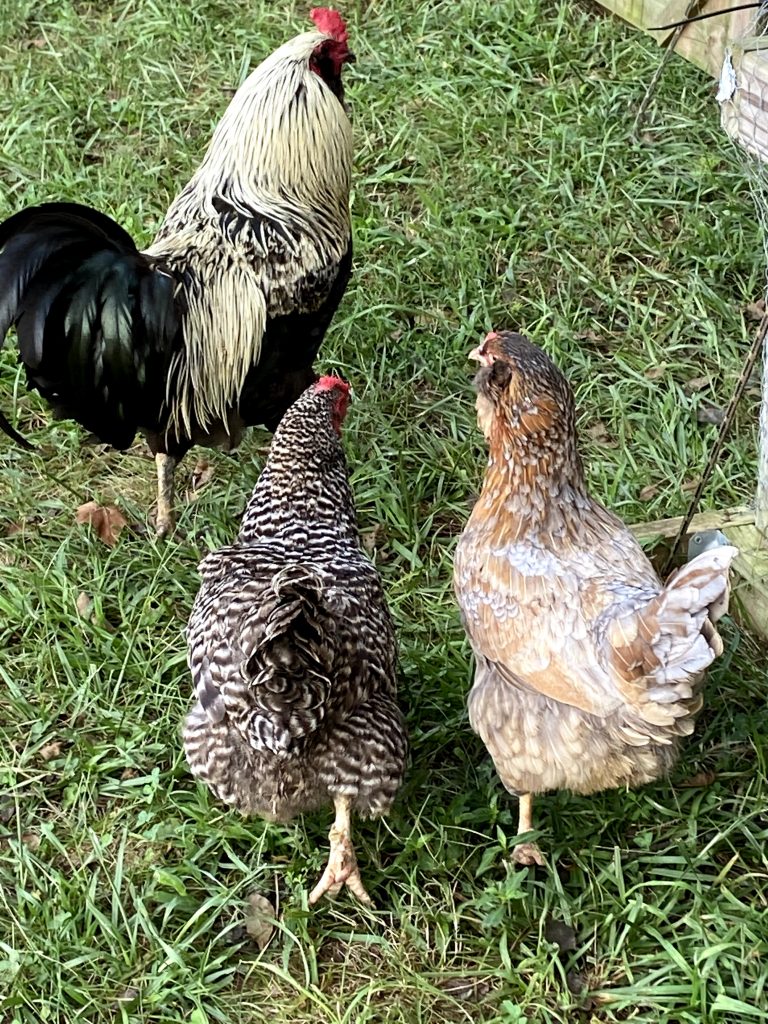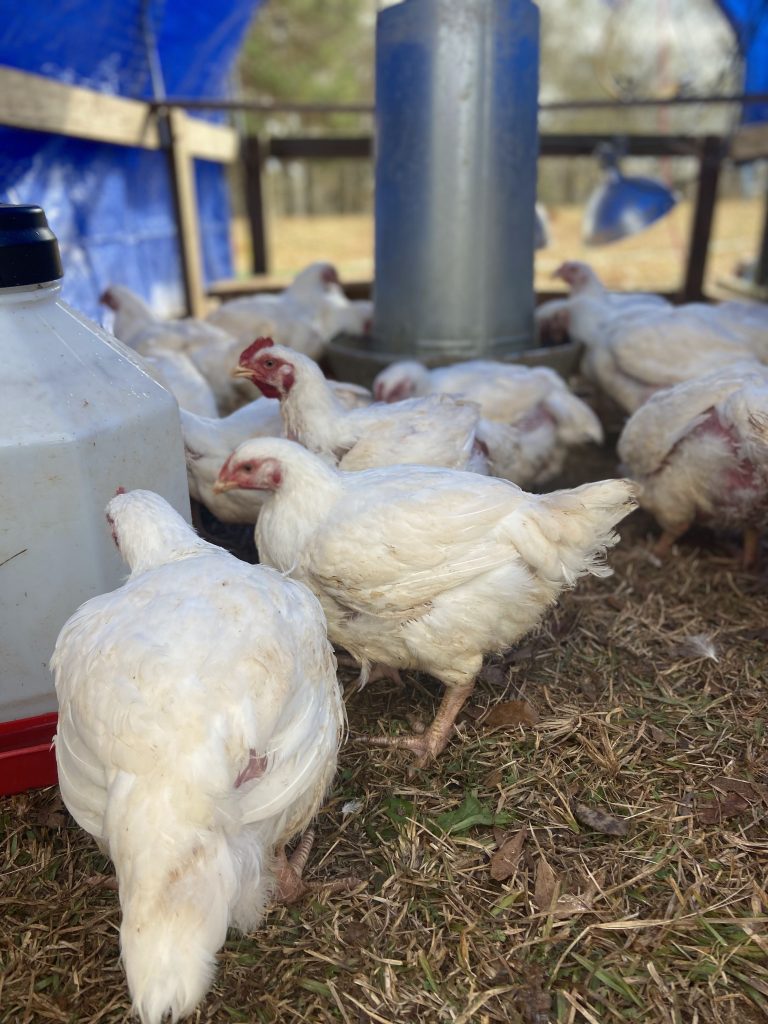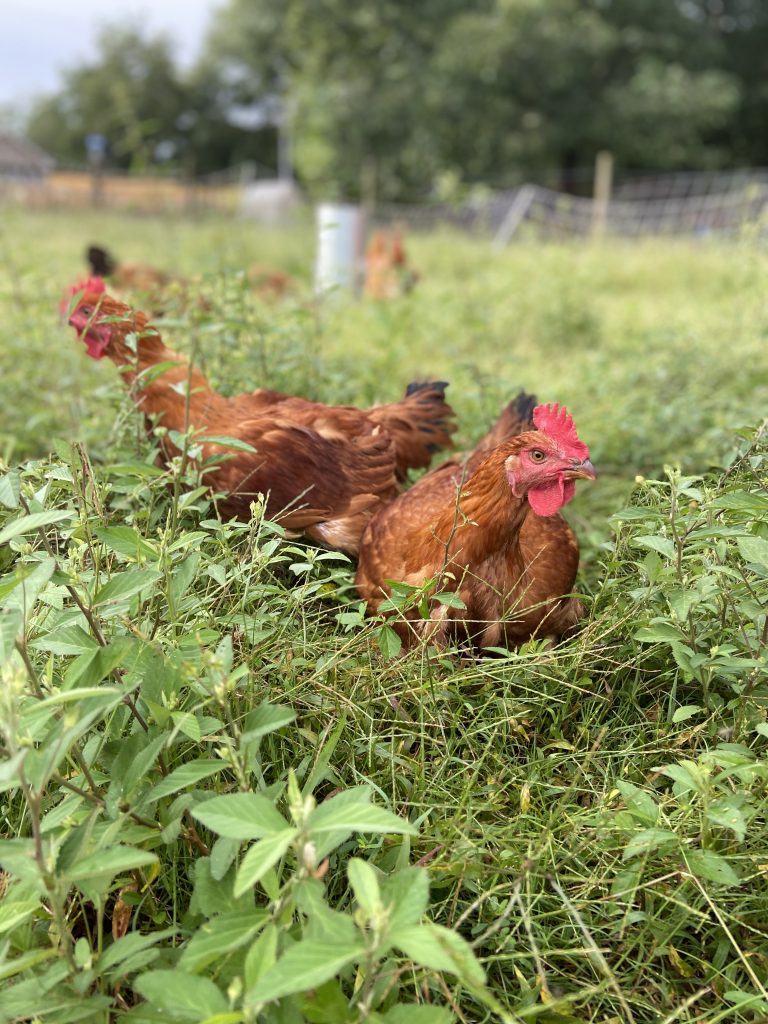One of my main goals here at Hidden Ridge Farm is to be able to grow and raise food for our family. That was the drive for us to sell our house in a subdivision and to move out onto a piece of property where we could raise chickens and cows.
One of my top priorities when we first moved, other than painting, unpacking and pinching myself to make sure I wasn’t dreaming that we finally found a place, was to raise meat birds. I wanted to do it right away. Ok let’s be honest. I wanted to do everything right away, but I figured that out of everything, this would be the easiest. Ha! I had to stop after I wrote that and laugh…easiest not so much…yeah, hindsight, I had no idea back then. Poor naive, Dee. But I digress. I had some decisions to make. Things to consider were what type of chicken to raise, where they were going to be raised, in a pen or pastured, and what type of food to supplemental feed them.
I settled on starting with a Heritage breed for our first batch and working through the other options in subsequent rounds. A Heritage breed is really just a fancy name for the breeds that are known to be used as laying hens, though there are some standards that have to be met to be considered a heritage breed chicken. Hatcheries will find themselves with a surplus of rooster chicks since most people want to order pullets (young hens) and are willing to sell them at a discounted price. Not being confident in my abilities in chicken rearing, I chose the way of least investment, though it may have evened out as they do take a while to grow out. My record keeping was lacking in my first endeavor so I really don’t know for sure.

The second round found me trying the Cornish Cross chicken. This is typically the type of chicken that you will find at the grocery store. It is a type of hybrid chicken that was bred with the purpose of gaining weight very quickly. A Cornish Cross chicken will be able to be butchered in its 8th week, although waiting till its 12th week does yield a larger bird.

The third round was the Freedom Rangers breed. This breed does well at free ranging, thus the name, and takes a little longer to grow out than the Cornish Cross’s but less than the Heritage breeds. After growing out the three types of meat birds, Freedom Rangers was the winner. They seemed a hardier breed, did not take too terribly long to grow out, and personally, I like the taste out of all three types of chickens. I do, however, have friends who prefer the Cornish Cross or can’t taste a difference at all.

The decision to pasture the chickens was a fairly easy decision to make. We have the land and because I want to implement rotational grazing to help protect the land, it seemed putting chickens in tractors (movable coops) was the way to go. Plus it makes me happy to see them happy out on grass. The tractor the chickens are in is built to hold 30 birds. The birds spend most of their lives in a tractor once moved from the brooder box. It keeps them safe from predators. I will move the tractors twice a day to put them on fresh grass. Chickens are messy and poop a lot so for me this is a must.
The last couple weeks before butchering day, I will let them free range all day outside of their tractors. They do better not being on top of each other all day as they are big plus there are more opportunities to find bugs and worms to gobble up.
Even though making the decision to pasture the chickens, we knew that we would have to have supplemental feed. Oh the questions of supplemental feed! Medicated vs. non-medicated, non-GMO vs. GMO, non-GMO vs. organic, all these were decisions I had to make. I did give the first round of chickens one bag of medicated feed. I was terrified they were all going to die on me. However, on my second round, as my confidence grew and after I asked lots of questions of others who had raised meat birds, I decided to risk it and forgo the medicated feed. The chickens did fine. Granted two died over the first couple weeks but that isn’t uncommon. Many times hatcheries will send you extra chicks since they expect this to happen. Plus I would have lost all my birds if it was something that could have been prevented with medicated feed. With our third round with the Freedom Rangers, we didn’t lose any chicks. I am not sure if this is because of the hardiness of the breed and/or the fact that I started initially giving them sugar water after the stress and dehydration of being shipped in the mail. Though I ruled out medicated feed, I still had to decide if I wanted to focus on GMO, non-GMO or organic feed. Organic feed was easier to rule out just because it is way too expensive. After some testing and debate, I finally settled on a non-GMO and no soy feed. Like the type of breed I chose, I felt like this was the happy medium. I felt better about what I was feeding them without breaking the bank.
This spring found me more confident in my ability to handle raising meat birds, I decided on increasing the amount of chickens raised, so instead of 25 there are currently 50 chickens out in the tractors! Butchering day is quickly approaching, scheduled for the end of May, so we will see what that looks like with having twice as many birds as last butchering day.
When chicken processing days are done for the year, I give a big sigh of relief. Alright, a HUGE sigh of relief. Honestly, I really do not enjoy raising the meat birds, like really, really, really don’t enjoy it but I LOVE having my freezer full of meat that I feel good about eating and feeding my children, knowing the start to finish process,knowing what was given for our health, knowing all the hard work that went into providing it. I don’t enjoy it but it is worth it.